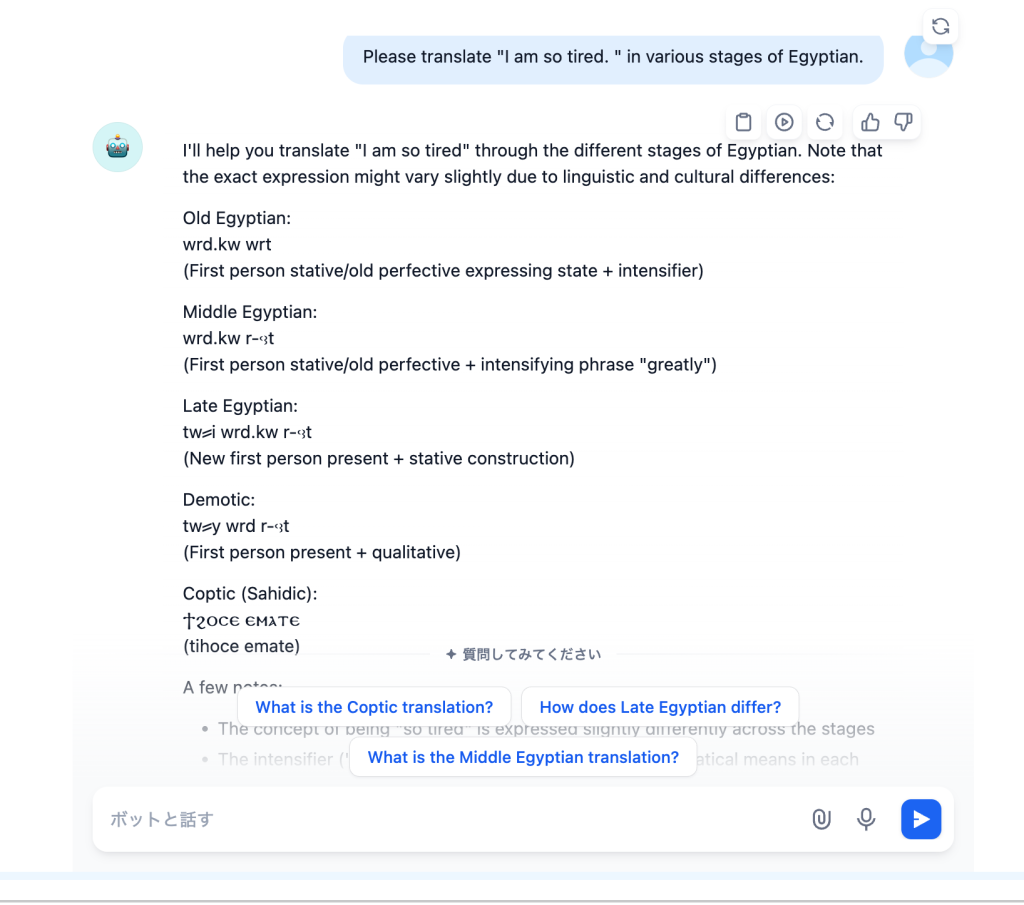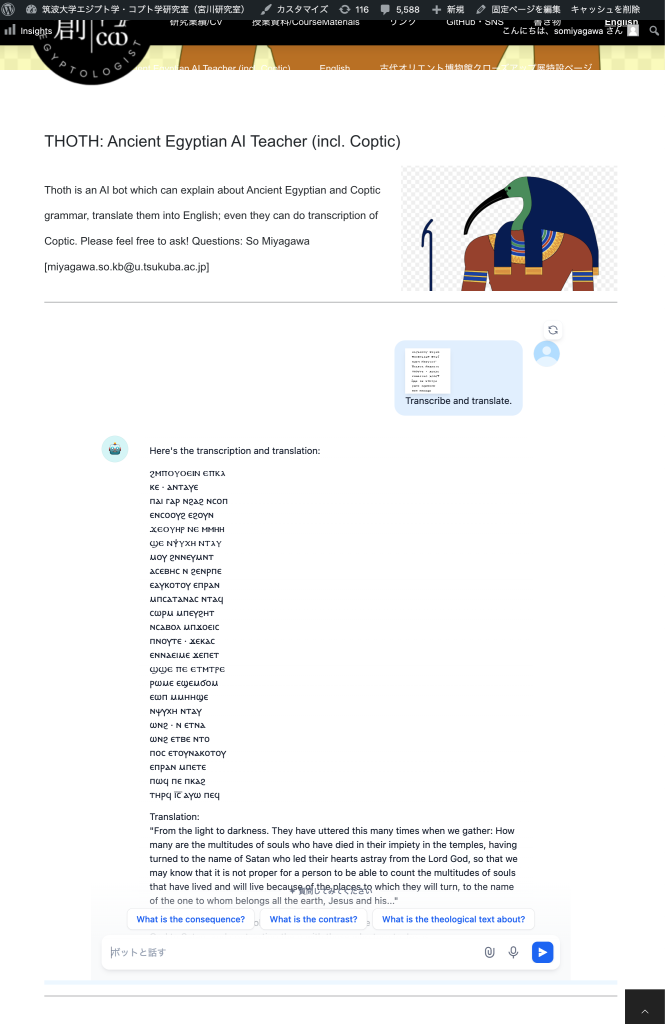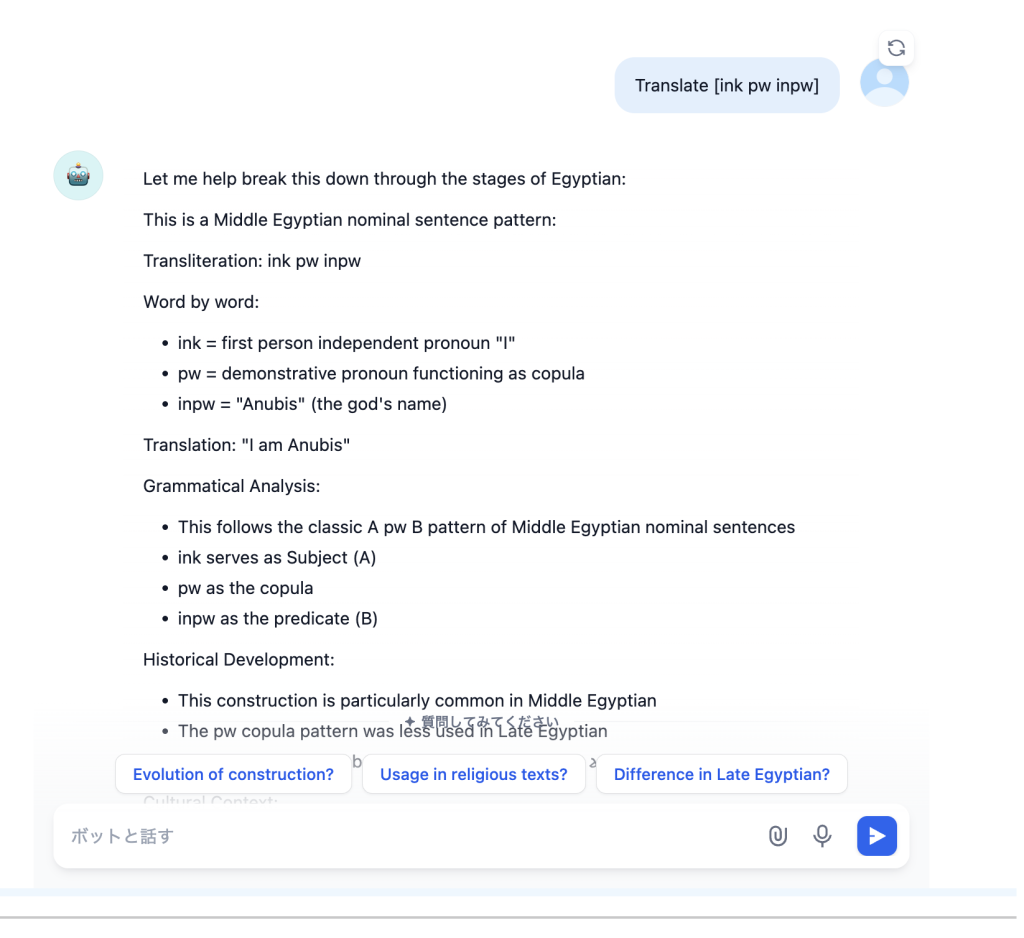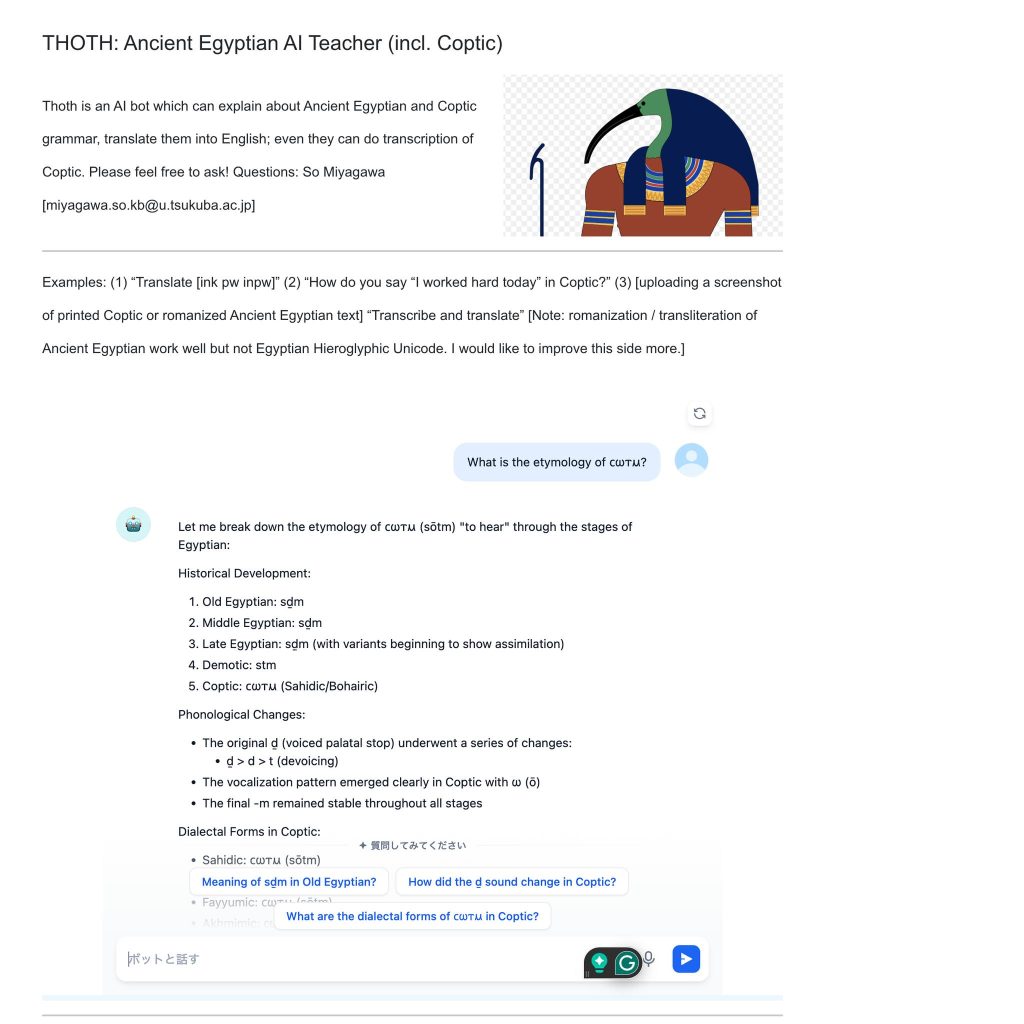To use THOTH AI, please log in.
THOTH.AI (Tsukuba Historical Old Text Hermeneutics through Artificial Intelligence; a.k.a. THOTH AI or Thoth AI or ThothAI or THOTH-AI) is an AI bot that can explain Ancient Egyptian and Coptic grammar and translate them into English or other major languages; it can even transcribe Coptic from a picture of printed texts. Please feel free to ask! Questions: So Miyagawa [miyagawa.so.kb@u.tsukuba.ac.jp] — Unfortunately, due to high demand, security issues, and some educational ethics concerns, I need to restrict the use of Thoth AI to sustain it. If you’re interested in using Thoth AI, please don’t hesitate to contact me with your name and motivation. I will give you a username and a password. (Also, in case of an emergency, I hid a tentative user name and a password on this webpage; please find it.) If I had more money or a grant, I would enforce my server so that everyone can use Thoth AI freely… (if you can donate to Thoth AI, please get in touch with me).
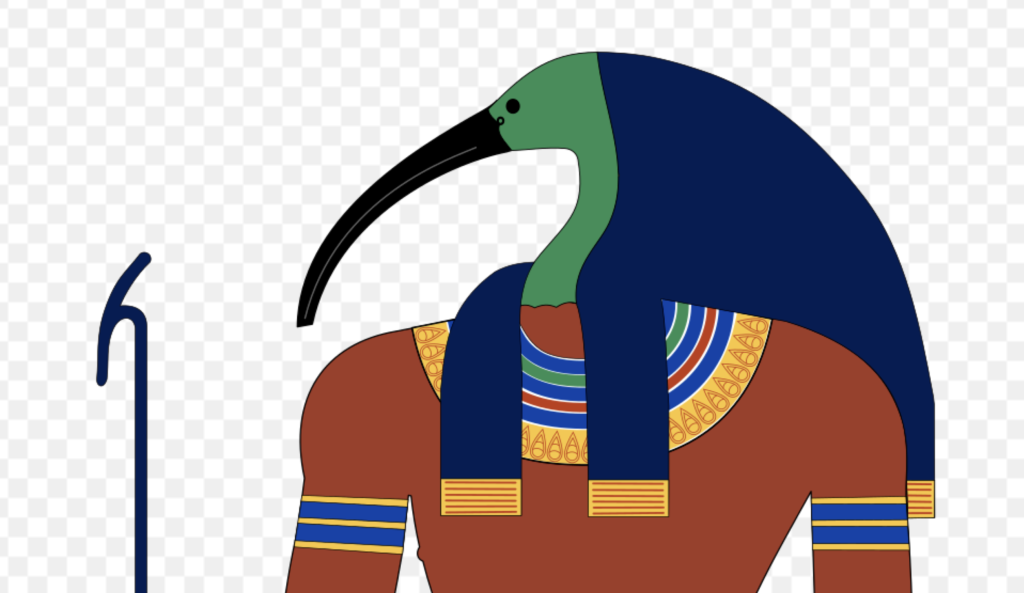
Unfortunately, due to the high demand, I have restricted access to THOTH AI to sustain it. What is THOTH in Ancient Egyptian? Please enter djehuty as the user name and toout as the password.
Examples: (1) “Translate [ink pw inpw]” (2) “How do you say “I worked hard today” in Coptic?” (3) [uploading a screenshot of printed Coptic or romanized Ancient Egyptian text] “Transcribe and translate” [Note: romanization/transliteration of Ancient Egyptian work well but not Egyptian Hieroglyphic Unicode. I want to improve this side more.] (4) “Please tell me the etymology of ⲥⲱⲧⲙ.” [Note: So far, OCR does not work for actual manuscript photos and Hieroglyphs, Hieratics, and Demotics, but only Coptic text and transliterated (romanized) Ancient Egyptian text. OK: rn=j pw wsrkn. / ⲡⲁⲣⲁⲛ ⲡⲉ ⲥⲱ / paran pe sô. Not good: 𓂋𓈖𓀀𓊪𓅱𓍯𓐠𓂋𓎡𓈖𓀀]
WARNINGS: This is an AI that learned Ancient Egyptian–Coptic linguistics to some extent. Please check carefully whether the output is correct or not. Unless it is a casual use, I recommend asking the question to professional Egyptologists / Coptologists instead of this AI app. We can never ever replace professionals with AI at all. Also, you should search at professional databases and corpora such as Thesaurus Linguae Aegyptiae or Coptic SCRIPTORIUM & Coptic Dictionary Online. Anyway, please be careful with AI hallucinations [-> What are AI hallucinations?]. I can’t guarantee anything about this AI app. But if you encounter a problem or find errors, it is very helpful if you report it to me: miyagawa.so.kb@u.tsukuba.ac.jp . We can improve THOTH together. (I will write a gratitude to you in the acknowlegements or we can write a paper on it together!)
Acknowledgments: THOTH uses Claude 4.5 Sonnet as RAG LLM and Comprehensive Coptic Lexicon ver.1.2 data as the RAG data.
D. Burns, F. Feder, K. John, M. Kupreyev, et al. 2020-07-24. Comprehensive Coptic Lexicon: Including Loanwords from Ancient Greek, Berlin: Freie Universität Berlin, http://dx.doi.org/10.17169/refubium-27566
The exact data I used is here:
https://github.com/KELLIA/dictionary/blob/master/xml/Comprehensive_Coptic_Lexicon-v1.2-2020.xml
Also, I vectorized this dictionary and gave it to THOTH AI to do RAG:
Raymond Oliver Faulkner, 1962, A Concise Dictionary of Middle Egyptian, Oxford: Griffith Institute.
Furthermore, I gave THOTH AI instruction prompts which are over 500 lines.
If too many people use THOTH at the same time, it can be temporarily down. Please let me know if you find it is down (e.g. does not answer). –> miyagawa.so.kb@u.tsukuba.ac.jp
Down history: January 23, 2025, 5PM-9PM in EST, ca. four hours. Februrary 8-Februrary 9, 0:04 (JST), occruing client-side errors –> Fixed on Februrary 9 0:04, Around February 23 –> Fixed on the same data, October 30, 2025 JST errors from Claude 3.5 Sonnet –> Fixed in October 31, 2025. I changed the base model to Claude 4.5 Sonnet on Novemebr 2 JST.
About me and this project
So Miyagawa is an associate professor of linguistics and Egyptology at the University of Tsukuba, specializing in the Ancient Egyptian–Coptic language. Following doctoral research at the University of Göttingen’s Seminar for Egyptology and Coptic Studies on the computational linguistic study of Coptic monastic writings, his work integrates computational linguistic methods with traditional philological approaches to ancient and medieval Nile Valley languages, including Ancient Egyptian–Coptic, Old Nubian, Greek, Arabic, and Meroitic, as well as endangered languages in and around the Japanese Archipelago.
THOTH (https://somiyagawa.com/thoth) is an AI-powered chatbot that analyzes and translates Ancient Egyptian and Coptic texts, created on the Dify platform using Claude 3.5 Sonnet as the base LLM (large-language model) with RAG (retrieval augmented generation) from various Egyptological and Coptological data. The system implements advanced natural language processing techniques to parse grammatical structures, perform OCR on Coptic and Ancient Egyptian transliteration printed texts, and facilitate research queries and pedagogical applications. While THOTH represents significant technological progress in digital Egyptology, results require verification against established resources, including the Thesaurus Linguae Aegyptiae, Coptic SCRIPTORIUM, and Coptic Dictionary Online.
The system complements traditional scholarship, automating routine, quick analytical tasks to enable more profound interpretive work. This approach fosters interdisciplinary collaboration between linguistics, archaeology, and computer science. Moreover, THOTH’s translation and mentoring function can help revitalize the Bohairic Coptic movement. Additionally, THOTH can be combined with music-generative AI such as SUNO and can be a powerful tool for creating Coptic songs. Through systematic user feedback integration and iterative development, THOTH’s capabilities continue to expand. The project attempts to show how emerging technologies can enhance ancient language research while maintaining rigorous scholarly standards.
Use cases: Coptic AI Songs
Sample screenshots:
